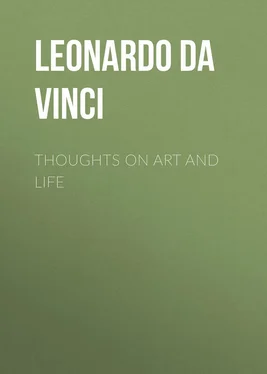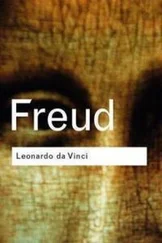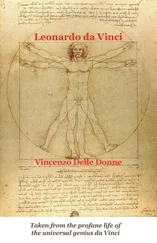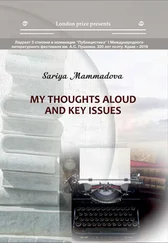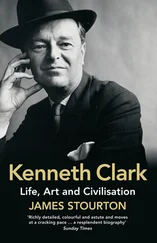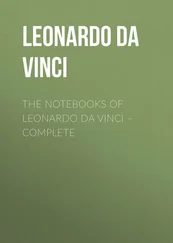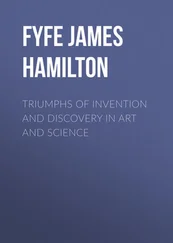Leonardo da Vinci - Thoughts on Art and Life
Здесь есть возможность читать онлайн «Leonardo da Vinci - Thoughts on Art and Life» — ознакомительный отрывок электронной книги совершенно бесплатно, а после прочтения отрывка купить полную версию. В некоторых случаях можно слушать аудио, скачать через торрент в формате fb2 и присутствует краткое содержание. Жанр: foreign_home, visual_arts, foreign_antique, foreign_prose, на английском языке. Описание произведения, (предисловие) а так же отзывы посетителей доступны на портале библиотеки ЛибКат.
- Название:Thoughts on Art and Life
- Автор:
- Жанр:
- Год:неизвестен
- ISBN:нет данных
- Рейтинг книги:4 / 5. Голосов: 1
-
Избранное:Добавить в избранное
- Отзывы:
-
Ваша оценка:
- 80
- 1
- 2
- 3
- 4
- 5
Thoughts on Art and Life: краткое содержание, описание и аннотация
Предлагаем к чтению аннотацию, описание, краткое содержание или предисловие (зависит от того, что написал сам автор книги «Thoughts on Art and Life»). Если вы не нашли необходимую информацию о книге — напишите в комментариях, мы постараемся отыскать её.
Thoughts on Art and Life — читать онлайн ознакомительный отрывок
Ниже представлен текст книги, разбитый по страницам. Система сохранения места последней прочитанной страницы, позволяет с удобством читать онлайн бесплатно книгу «Thoughts on Art and Life», без необходимости каждый раз заново искать на чём Вы остановились. Поставьте закладку, и сможете в любой момент перейти на страницу, на которой закончили чтение.
Интервал:
Закладка:
Life's Philosophy
Now you see that the hope and the desire of returning home to one's former state is like the desire of the moth for the light, and the man who, with constant yearning and joyful expectancy, awaits the new spring and the new summer, and every new month and the new year, and thinks that what he longs for is ever too late in coming, and does not perceive that he is longing for his own destruction. But this desire is the quintessence, the spirit, of the elements, which, finding itself captive in the soul of the human body, desires always to return to its giver. And I would have you know that this same desire is the quintessence which is inseparable from nature, and that man is the model of the world. And such is the supreme folly of man that he labours so as to labour no more, and life flies from him while he forever hopes to enjoy the goods which he has acquired at the price of great labour.
The Senses and the Soul
The soul seems to dwell in the intellect, and the intellect appears to dwell in that part where all the senses meet which is called the brain, and the brain does not pervade the whole body, as many have thought; on the contrary, it dwells entirely in one part, because if it were all in all and the same in every part, it would not have been necessary for the instruments of the senses to combine among themselves in one single spot; but rather, it would have been sufficient for the eye to fulfil the function of its sensation on the surface without transmitting, by means of the optic nerves, the likeness of its vision to the brain, so that the soul, for the reason given above, might perceive it in the surface of the eye. Likewise, with regard to the sense of hearing, it would have been sufficient if the voice had sounded only in the porous cavity of the indurated bone which lies within the ear, without making any further transit from this bone to the brain, which is its destination and where it discourses with common judgement. The sense of smell, too, is likewise compelled by necessity to proceed to the intellect; the sense of touch passes through the nerves and is conveyed to the brain, and these nerves diverge with infinite ramification in the skin, which encloses the limbs of the body and the entrails. The nerves convey volition and sensation to the muscles, and these nerves and the tendons which lie between the muscles and the sinews give movement to them; the muscles and sinews obey, and this obedience takes effect by the decrease of their thickness, for in swelling their length is reduced, and the tendons which are interwoven among the particles of the limbs shrink, and as they extend to the tips of the fingers they transmit to the brain the cause of the sense of touch which they feel. The tendons with their muscles obey the nerves as soldiers obey their officers, and the nerves obey the brain as the officers obey their captain; thus the joint of the bones obeys the tendon, and the tendons obey the muscles, and the muscles obey the nerves, and the nerves obey the brain, and the brain is the dwelling of the soul, and the memory is its ammunition and the perception is its refundary.
Of Sensation
The brain is that which perceives what is transmitted to it by the other senses. The brain moves by means of that which is transmitted to it by the five senses. Motion is transmitted to the senses by objects, and these objects, transmitting their images to the five senses, are transferred by them to the perception, and by the perception to the brain; and there they are comprehended and committed to the memory, in which, according to their intensity, they are more or less firmly retained.
The thinkers of ancient times concluded that the part of man which constitutes his intellect is caused by an instrument to which the other five senses refer everything by means of the perception, and this instrument they have named the "common sense" or brain, and they say that this sense is situated in the centre of the head. And they have given it this name "common sense" solely because it is the common judge of the five other senses, that is to say, sight, hearing, touch, taste and smell. The "common sense" is stirred by means of the perception which is placed between it and the senses. The perception is stirred by means of the images of things conveyed to it by the external instruments to the senses, and these are placed in the centre between the external things and the perception, and the senses likewise are stirred by objects. Surrounding objects transmit their images to the senses, and the senses transfer them to the perception, and the perception transfers them to the "common sense" (brain), and by it they are stamped upon the memory, and are there retained in a greater or lesser degree according to the importance and intensity of the impression. The sense which is most closely connected with the perception is the most rapid in action, and this sense is the eye, the highest and chief of the others; of this sense alone we will treat, and we will leave the others in order not to unduly lengthen our matter.
Automatic Movements
Nature has ordained for man the ministering muscles which exercise the sinews, and by means of which the limbs can be moved according to the will and desire of the brain, like to officers distributed by a ruler over many provinces and towns, who represent their ruler in these places, and obey his will. And this officer, who will in a single instance have most faithfully obeyed the orders he received from his master by word of mouth, will afterwards, in a similar way, of his own accord fulfil the wishes of his master.
An example of this can be frequently seen in the fingers, which learn to perform on an instrument the things which the intellect commands, and the lesson once learnt they will perform it without the aid of the intellect. And do not the muscles which cause the legs to move perform their duty without man being conscious of it?
You will see palsied and shivering persons move, and their trembling limbs, such as their head and hands, quiver, without the permission of the soul, and the soul, though it expend all its might, cannot prevent these limbs from trembling. The same thing occurs in epilepsy or when limbs are partially truncated, as in the case of tails of lizards.
Intellect
It happens that our intellect is that which prompts the hand to create the features of figures in divine aspects until it finds satisfaction; and since the intellect is one of the tones of our soul, by means of the soul it composes the form of the body where it dwells, according to its volition. And when it has to reproduce a human body, it takes pleasure in repeating the body which it originally created; whence it follows that they who fall in love are prone to become enamoured of what resembles them.
Of the Senses
There are the four powers: memory, intellect, sensuality and lust. The first two are intellectual, the others sensual. Of the five senses, sight, hearing, smell are with difficulty prevented; touch and taste not at all. Taste follows smell in the case of dogs and other greedy animals.
Why does the eye perceive things more clearly in dreams than with the imagination when one is awake?
Time
Although time is included among continuous quantities, being indivisible and immaterial it does not altogether fall into the scope of geometry, – by which it is divided into figures and bodies of infinite variety, which are seen to be continuous inasmuch as they are visible and material, – but it agrees only with its first principles, i. e. with the point and the line; the point in time may be compared to an instant, and the line to the length of a certain quantity of time. Just as the point is the beginning and end of a line, so is an instant the beginning and end of any given space of time; and just as a line is infinitely divisible, so can a given space of time be likewise divided, and as the divisions of the line are in proportion to each other, so likewise are the divisions of time.
Читать дальшеИнтервал:
Закладка:
Похожие книги на «Thoughts on Art and Life»
Представляем Вашему вниманию похожие книги на «Thoughts on Art and Life» списком для выбора. Мы отобрали схожую по названию и смыслу литературу в надежде предоставить читателям больше вариантов отыскать новые, интересные, ещё непрочитанные произведения.
Обсуждение, отзывы о книге «Thoughts on Art and Life» и просто собственные мнения читателей. Оставьте ваши комментарии, напишите, что Вы думаете о произведении, его смысле или главных героях. Укажите что конкретно понравилось, а что нет, и почему Вы так считаете.
